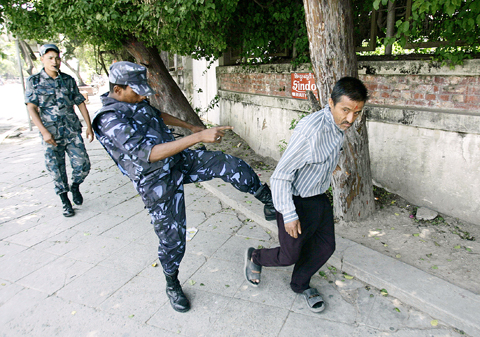Nepal celebrated a new era as the world’s youngest republic yesterday after consigning its centuries-old monarchy to the history books and ordering god-king Gyanendra to quit his palace in two weeks.
In an unprecedented vote capping a peace accord between Maoists and mainstream parties, a new constitutional assembly voted just before midnight on Wednesday to abolish the 240-year-old monarchy and establish a republic.
Yesterday morning, the flag of the Shah dynasty was taken down from the main palace in Kathmandu, which will now be turned into a national museum.

PHOTO: AP
“The royal flag was replaced by Nepal’s national flag inside the palace,” a palace official said on condition of anonymity. “The flag has been changed as part of the government decision to implement a republic.”
The new republic declared yesterday and today national holidays, as supporters sang and danced on Kathmandu’s streets after waiting all day for the vote.
The Maoists, clear winners of last month’s elections, waged a decade of war to overthrow what they view as a backward, caste-ridden structure that kept most of Nepal’s 29 million people living in dire poverty.
They have repeatedly warned King Gyanendra he faces “strong punishment” if he refuses to bow out gracefully.
“The Nepalese people have been freed from centuries of feudal tradition and the doors have now opened for a radical social and economic transformation,” Maoist spokesman Krishna Bahadur Mahara said after the vote.
The country’s press hailed the republic.
“Turning Nepal into a republic is the biggest achievement of the people in the history of this country,” wrote Kathmandu Post editor Prateek Pradhan in a letter to readers.
Many ordinary Nepalese are delighted to see the back of the dour, unpopular king as well as his son and would-be heir, Crown Prince Paras — notorious for his playboy lifestyle.
“There was no development under the monarchy,” said Prakash Karki, 26, a businessman, as he bought a newspaper. “There will be now that the people will run the country.”
UN Secretary-General Ban Ki-moon welcomed the vote, saying Nepalese “have clearly spoken for peace and change.”
The US, which continues to list the former rebels as a foreign “terrorist” organization, urged “forward political developments” in Nepal, US State Department spokesman Tom Casey said in Washington.
The vote in the 601-member assembly saw just four lawmakers oppose the declaration transforming Nepal into a secular republic.
“All the privileges enjoyed by the king and royal family will automatically come to an end,” the declaration states, noting that the day will be known as “Republic Day.”
The ultra-left Maoists won over a third of the seats in the assembly and are set to lead the new government, although many remain skeptical of a movement whose loyalists are regularly accused of using violence and intimidation.
And the ex-rebels face a difficult task improving life for a people weary of civil strife.
“Whenever I go out there’s a bomb blast, a strike or a demonstration. These are the daily worries,” said Seema Pradhan, 25, at her family’s neighborhood shop. “I hope they will be able to make things better.”

Four people jailed in the landmark Hong Kong national security trial of "47 democrats" accused of conspiracy to commit subversion were freed today after more than four years behind bars, the second group to be released in a month. Among those freed was long-time political and LGBTQ activist Jimmy Sham (岑子杰), who also led one of Hong Kong’s largest pro-democracy groups, the Civil Human Rights Front, which disbanded in 2021. "Let me spend some time with my family," Sham said after arriving at his home in the Kowloon district of Jordan. "I don’t know how to plan ahead because, to me, it feels

The collapse of the Swiss Birch glacier serves as a chilling warning of the escalating dangers faced by communities worldwide living under the shadow of fragile ice, particularly in Asia, experts said. Footage of the collapse on Wednesday showed a huge cloud of ice and rubble hurtling down the mountainside into the hamlet of Blatten. Swiss Development Cooperation disaster risk reduction adviser Ali Neumann said that while the role of climate change in the case of Blatten “still needs to be investigated,” the wider impacts were clear on the cryosphere — the part of the world covered by frozen water. “Climate change and

Poland is set to hold a presidential runoff election today between two candidates offering starkly different visions for the country’s future. The winner would succeed Polish President Andrzej Duda, a conservative who is finishing his second and final term. The outcome would determine whether Poland embraces a nationalist populist trajectory or pivots more fully toward liberal, pro-European policies. An exit poll by Ipsos would be released when polls close today at 9pm local time, with a margin of error of plus or minus 2 percentage points. Final results are expected tomorrow. Whoever wins can be expected to either help or hinder the

DENIAL: Musk said that the ‘New York Times was lying their ass off,’ after it reported he used so much drugs that he developed bladder problems Elon Musk on Saturday denied a report that he used ketamine and other drugs extensively last year on the US presidential campaign trail. The New York Times on Friday reported that the billionaire adviser to US President Donald Trump used so much ketamine, a powerful anesthetic, that he developed bladder problems. The newspaper said the world’s richest person also took ecstasy and mushrooms, and traveled with a pill box last year, adding that it was not known whether Musk also took drugs while heading the so-called US Department of Government Efficiency (DOGE) after Trump took power in January. In a